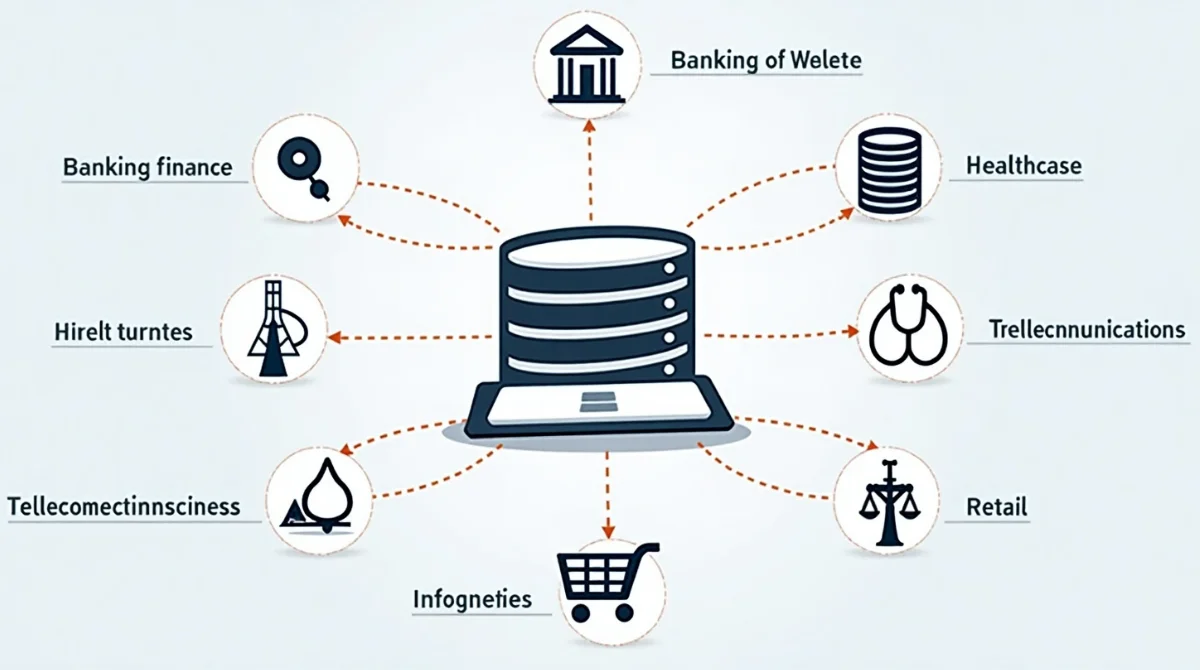Oracle’s Relational Database Management System (RDBMS) is a powerful tool used by many businesses to store and manage data. It’s like a digital filing cabinet that helps companies keep their information organized and accessible. Let’s explore how Oracle RDBMS is used in everyday business operations.
What is Oracle RDBMS?
At its core, Oracle RDBMS is software that allows users to create, manage, and interact with databases. It uses a language called SQL (Structured Query Language) to perform tasks like retrieving data, updating records, and managing database structures. Think of it as a smart assistant that helps you handle large amounts of information efficiently.
Key Features of Oracle RDBMS
Oracle RDBMS includes several features that make it reliable, secure, and efficient for managing business data. Below is a breakdown of its most important features explained in simple terms.
1. Data Consistency
Oracle ensures that the data in the database stays accurate and reliable. For example, when a transaction takes place, like a payment or an update, the database makes sure everything changes correctly and matches across all records. This helps avoid errors or mismatched data.
2. Scalability
As a business grows, so does the amount of data it needs to handle. Oracle RDBMS is built to grow with the business. Whether there are a few users or thousands, the system can manage large volumes of data and users without slowing down, making it ideal for both small and large companies.
3. Security
Keeping data safe is one of Oracle’s top priorities. The system allows administrators to control who can access or update specific information. It also uses encryption and other security measures to prevent unauthorized access, protecting sensitive business and customer data from threats.
4. High Availability
Oracle RDBMS is designed to work continuously, with very little downtime. Even if there is a technical problem, the system has ways to stay available or recover quickly. This means businesses can continue their work without long interruptions, which is important for operations that rely on constant access to data.
5. Backup and Recovery
Accidents or failures can happen, but Oracle has strong backup and recovery tools. It regularly saves copies of the database so that if something goes wrong like a system crash, data deletion, or error the data can be quickly restored. This helps prevent data loss and ensures business continuity.
Common Applications of Oracle RDBMS
Oracle RDBMS is not just powerful; it’s flexible too. It is used in many different industries to handle important data and make daily operations smoother. Here’s how it supports different types of businesses and services:
1. Enterprise Resource Planning (ERP)
ERP systems bring together different business processes like accounting, human resources, and supply chain operations into one system. Oracle RDBMS acts as the central hub for all the data these systems use. It stores employee records, financial data, inventory details, and more making sure everything is in one place and easily accessible when needed.
2. Customer Relationship Management (CRM)
CRM software helps companies build and maintain strong relationships with their customers. Oracle RDBMS stores all customer-related data, such as contact details, purchase history, support tickets, and messages. This allows businesses to offer personalized services and better customer care, which leads to higher satisfaction and loyalty.
3. Online Transaction Processing (OLTP)
This is important for industries that deal with large numbers of daily transactions, like banks or online stores. Oracle RDBMS can handle thousands of transactions at once such as withdrawals, payments, or order confirmations quickly and without errors. It ensures that each transaction is completed safely and efficiently.
4. Data Warehousing
Over time, companies collect a lot of information. Oracle RDBMS helps in storing this data in a special way called data warehousing. This means businesses can save years of data and use it later for reports, trend analysis, and planning future strategies.
5. Business Intelligence (BI) and Analytics
Oracle RDBMS allows businesses to study their data through charts, dashboards, and reports. This helps managers and executives understand how the business is performing. For example, they can track sales trends, identify top-performing products, or spot areas that need improvement.
6. Healthcare Information Systems
In the healthcare industry, accuracy and privacy are essential. Hospitals and clinics use Oracle RDBMS to manage patient records, doctor schedules, lab reports, and billing. This system helps keep everything organized and ensures that patient information is safe and easy to retrieve when needed.
7. Telecommunications
Telecom companies like mobile and internet providers use Oracle RDBMS to store and manage a wide range of data. This includes customer contact details, call history, service usage, billing information, and more. It supports real-time data processing, which is vital for customer service and billing accuracy.
8. E-Commerce Platforms
Online shopping websites use Oracle RDBMS to manage everything from product listings and customer accounts to shopping carts and payment details. It ensures that the shopping experience is smooth, and customers can browse, buy, and pay without problems.
9. Government Systems
Government departments use Oracle RDBMS to store important data such as citizen records, tax information, vehicle registrations, and voting data. It helps improve service delivery, data accuracy, and public administration.
10. Supply Chain Management
Oracle RDBMS helps businesses manage the journey of a product from manufacturing to delivery. It stores information about inventory, warehouse locations, shipping, and orders. This helps reduce delays and keeps operations running smoothly by making sure products get to customers on time.
Real-World Examples of Oracle RDBMS
Oracle RDBMS isn’t just theory it plays an important role in real businesses and government organizations around the world. Let’s explore how it works in actual, everyday scenarios across different sectors.
1. Banking
Banks deal with large amounts of money and sensitive personal data every single day. They use Oracle RDBMS to store customer account details, keep track of transactions like deposits and withdrawals, and protect that data from unauthorized access. With Oracle, banking systems can handle thousands of transactions per minute while making sure everything is safe, accurate, and secure.
2. Retail
Retail companies, especially those with many branches or online stores, use Oracle RDBMS to manage product inventory across all their locations. It helps them keep track of which items are selling, when to restock, and how much money they’re making. Some retailers also use it to run customer loyalty programs by storing purchase histories and offering rewards based on past buying behavior.
3. Healthcare
Hospitals and clinics must manage lots of information like patient histories, appointment schedules, lab test results, and billing records. Oracle RDBMS helps them store all this data in one secure system. Doctors can easily access patient info, nurses can schedule appointments more efficiently, and the accounting team can handle billing without errors. Most importantly, Oracle helps ensure that sensitive medical data is kept private and secure.
4. Telecommunications
Telecom companies serve millions of customers and handle massive amounts of data every day. They use Oracle RDBMS to manage subscriptions, track call records, and monitor network performance. With this system, they can send accurate bills to users, identify and fix service issues, and even offer personalized plans based on usage patterns. It also helps improve customer service by making data quickly accessible to support staff.
5. Government
Government departments often manage large and critical datasets. Oracle RDBMS helps them store and organize records such as national IDs, tax details, land records, and voter registrations. It makes data management efficient and secure, while also supporting digital services for the public. This helps reduce paperwork, improve accuracy, and speed up the delivery of services like issuing passports or collecting taxes.
Conclusion
Oracle RDBMS is a powerful tool that helps businesses manage and utilize their data effectively. Its versatility and robust features make it suitable for various applications across different industries. Whether it’s handling transactions, managing customer relationships, or analyzing data, Oracle RDBMS plays a crucial role in modern business operations.



